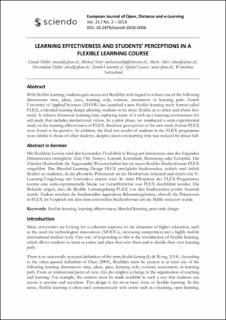Please use this identifier to cite or link to this item:
https://doi.org/10.21256/zhaw-3189Full metadata record
| DC Field | Value | Language |
|---|---|---|
| dc.contributor.author | Müller Werder, Claude | - |
| dc.contributor.author | Stahl, Michael | - |
| dc.contributor.author | Alder, Markus | - |
| dc.contributor.author | Müller, Maximilian | - |
| dc.date.accessioned | 2018-12-18T15:03:29Z | - |
| dc.date.available | 2018-12-18T15:03:29Z | - |
| dc.date.issued | 2018 | - |
| dc.identifier.issn | 1027-5207 | de_CH |
| dc.identifier.uri | https://digitalcollection.zhaw.ch/handle/11475/13937 | - |
| dc.description.abstract | With flexible learning, students gain access and flexibility with regard to at least one of the following dimensions: time, place, pace, learning style, content, assessment or learning path. Zurich University of Applied Sciences (ZHAW) has launched a new flexible learning study format called FLEX, a blended learning design allowing students to be more flexible as to when and where they study. It reduces classroom learning time, replacing some of it with an e-learning environment for self-study that includes instructional videos. In a pilot phase, we conducted a semi-experimental study on the learning effectiveness of FLEX. Students’ perceptions of the new study format FLEX were found to be positive. In addition, the final test results of students in the FLEX programme were similar to those of other students, despite classroom learning time was reduced by about half. | de_CH |
| dc.language.iso | en | de_CH |
| dc.publisher | De Gruyter | de_CH |
| dc.relation.ispartof | European Journal of Open, Distance and E-Learning | de_CH |
| dc.rights | https://creativecommons.org/licenses/by-nc-nd/4.0/ | de_CH |
| dc.subject | Flexible learning | de_CH |
| dc.subject | Learning effectiveness | de_CH |
| dc.subject | Blended learning | de_CH |
| dc.subject | Post-only design | de_CH |
| dc.subject.ddc | 371: Schulen und schulische Tätigkeiten | de_CH |
| dc.title | Learning effectiveness and students’ perceptions in a flexible learning course | de_CH |
| dc.type | Beitrag in wissenschaftlicher Zeitschrift | de_CH |
| dcterms.type | Text | de_CH |
| zhaw.departement | School of Management and Law | de_CH |
| zhaw.organisationalunit | Zentrum für Innovative Didaktik (ZID) | de_CH |
| dc.identifier.doi | 10.2478/eurodl-2018-0006 | de_CH |
| dc.identifier.doi | 10.21256/zhaw-3189 | - |
| zhaw.funding.eu | No | de_CH |
| zhaw.issue | 2 | de_CH |
| zhaw.originated.zhaw | Yes | de_CH |
| zhaw.pages.end | 52 | de_CH |
| zhaw.pages.start | 44 | de_CH |
| zhaw.publication.status | publishedVersion | de_CH |
| zhaw.volume | 21 | de_CH |
| zhaw.publication.review | Peer review (Publikation) | de_CH |
| zhaw.funding.zhaw | Flexibles Lernen Research | de_CH |
| Appears in collections: | Publikationen School of Management and Law | |
Files in This Item:
| File | Description | Size | Format | |
|---|---|---|---|---|
| 2018_Mueller-etal_Learning-effectiveness-flexible-learning-course.pdf | 518.84 kB | Adobe PDF |  View/Open |
Show simple item record
Müller Werder, C., Stahl, M., Alder, M., & Müller, M. (2018). Learning effectiveness and students’ perceptions in a flexible learning course. European Journal of Open, Distance and E-Learning, 21(2), 44–52. https://doi.org/10.2478/eurodl-2018-0006
Müller Werder, C. et al. (2018) ‘Learning effectiveness and students’ perceptions in a flexible learning course’, European Journal of Open, Distance and E-Learning, 21(2), pp. 44–52. Available at: https://doi.org/10.2478/eurodl-2018-0006.
C. Müller Werder, M. Stahl, M. Alder, and M. Müller, “Learning effectiveness and students’ perceptions in a flexible learning course,” European Journal of Open, Distance and E-Learning, vol. 21, no. 2, pp. 44–52, 2018, doi: 10.2478/eurodl-2018-0006.
MÜLLER WERDER, Claude, Michael STAHL, Markus ALDER und Maximilian MÜLLER, 2018. Learning effectiveness and students’ perceptions in a flexible learning course. European Journal of Open, Distance and E-Learning. 2018. Bd. 21, Nr. 2, S. 44–52. DOI 10.2478/eurodl-2018-0006
Müller Werder, Claude, Michael Stahl, Markus Alder, and Maximilian Müller. 2018. “Learning Effectiveness and Students’ Perceptions in a Flexible Learning Course.” European Journal of Open, Distance and E-Learning 21 (2): 44–52. https://doi.org/10.2478/eurodl-2018-0006.
Müller Werder, Claude, et al. “Learning Effectiveness and Students’ Perceptions in a Flexible Learning Course.” European Journal of Open, Distance and E-Learning, vol. 21, no. 2, 2018, pp. 44–52, https://doi.org/10.2478/eurodl-2018-0006.
Items in DSpace are protected by copyright, with all rights reserved, unless otherwise indicated.